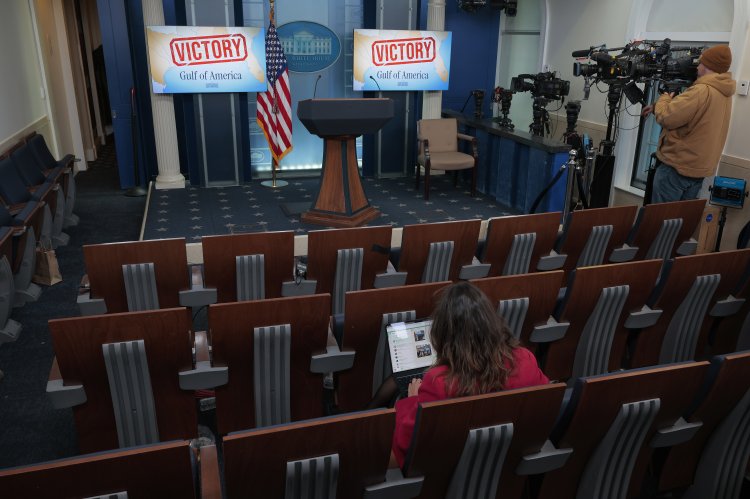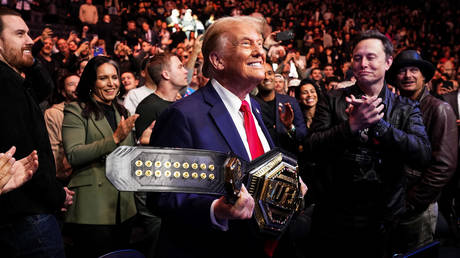Judge orders Trump to reinstate Associated Press to White House press pool
In a recent ruling, a judge emphasized the importance of adhering to constitutional standards, stating, “The Constitution requires no less.”

U.S. District Judge Trevor McFadden, appointed by Trump, ruled that the White House must restore the AP’s access to the Oval Office, Air Force One, and other designated areas whenever they are accessible to other journalists in the press pool.
“Under the First Amendment, if the Government opens its doors to some journalists — be it to the Oval Office, the East Room, or elsewhere — it cannot then shut those doors to other journalists because of their viewpoints. The Constitution requires no less,” McFadden articulated.
The judge characterized the White House’s blatant discrimination against the AP as “brazen,” asserting that such bias is impermissible, even in the restricted venues like the Oval Office, except for formal interviews.
McFadden pointed out that the AP’s exclusion from significant Oval Office events had inflicted serious harm on the wire service’s business, which he described as “hemorrhaging.” He referenced testimony from a recent hearing by the outlet’s leading White House photographer, Evan Vucci, and bureau chief Zeke Miller, who detailed their struggles to compete due to this exclusion.
The judge highlighted the critical nature of timely reporting for a wire service, emphasizing that being shut out jeopardizes its success. Quoting Vucci’s graphic assertion from the hearing, he noted that the AP is “getting absolutely slaughtered” by its competitors.
“To state the obvious, if the AP’s wire reporters are not in the room when news happens, they can hardly be the first to break the news. Instead, they are forced to wait and pick up whatever scraps of verifiable information they can find as they watch their competitors break the story first,” McFadden wrote. “These disadvantages have poisoned the AP’s business model.”
The judge postponed the enforcement of his order for five days, allowing the Trump administration time to file an appeal.
The White House had not immediately responded to inquiries regarding McFadden’s ruling.
In response, an AP spokesperson expressed gratitude for the judge’s decision.
“Today’s ruling affirms the fundamental right of the press and public to speak freely without government retaliation,” said Lauren Easton. “This is a freedom guaranteed for all Americans in the U.S. Constitution.”
At one point, McFadden seemed to critique the Trump administration's legal tactics during the case. Although he appeared convinced by the testimonies from Miller and Vucci, who captured the iconic image of Trump raising his fist after an assassination attempt last year, he noted the government's failure to present any witnesses in response.
While acknowledging that the administration's argument likening Oval Office photo-ops to one-on-one interviews had some merit, he pointed out that this analogy was not supported by any testimony or evidence.
McFadden remarked that Trump seemed to target the AP not solely because of its global reach but also due to its style guide. This guide states that Trump rebranded the Gulf of Mexico as the "Gulf of America," yet clarifies that “Trump's order only carries authority within the United States. Mexico, as well as other countries and international bodies, do not have to recognize the name change.”
“If there is a benign explanation for the Government’s decision, it has not been presented here,” the judge wrote concerning the White House’s treatment of the AP. “At the evidentiary hearing, the Government conceded that the record reveals viewpoint-discriminatory motives, so all indicators point to retaliation.”
McFadden’s ruling does not guarantee enhanced access for the AP to Trump or the White House, as he noted that the administration could still choose to limit coverage of certain events or assign them exclusively to its in-house media teams.
During a February hearing, McFadden mentioned the option for the White House to manage pool assignments independently, without relying on the White House Correspondents Association for press pool regulations. The subsequent day, the White House announced the end of the association’s oversight of the pool.
Since then, the AP has not been granted pool assignments by the White House, with officials claiming the wire service remains "eligible" for such roles.
In his ruling, McFadden concluded that the White House's changes to pool management did not negate the AP’s assertion that its exclusion from numerous presidential events infringes upon the First Amendment.
“The AP is not necessarily entitled to the ‘first in line every time’ permanent press pool access it enjoyed under the WHCA,” the judge concluded. “But it cannot be treated worse than its peer wire services either."
Sanya Singh for TROIB News












